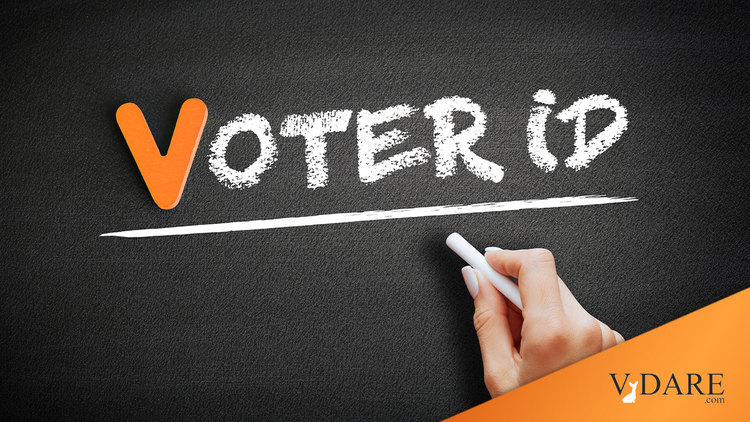
By Allan Wall
10/26/2013
The Texas voter ID law, while not as stringent as Mexico’s Voter ID system (see here) has been attacked as discriminatory by, among others, Eric Holder’s Justice Department.
Now, however, the law is actually being used in an election, and the news from El Paso, Texas is that it’s working smoothly:
County election officials said they haven’t experienced any problems in the first election in which Texans are required to provide an ID in order to vote.Early voting for the Nov. 5 election began Monday. This is the first time since Texas implemented its voter ID law that requires voters to show a valid form of identification before casting their ballot. "So far it’s not creating any problems at all. Everybody is complying with the law," said Javier Chacon, El Paso County elections administrator.
The article though has to include some unfounded criticism of the law:
But there are some who say the voter ID law will disenfranchise people of color and women. The law requires that the name on the identification card match the name listed on the voter registration card. This creates potential problems for some women who use maiden or hyphenated names.Democratic state Rep. Mary González of El Paso lashed out against the law and state Republicans in a statement saying, "The Texas GOP has long waged a war on women, and now they've taken that attack to our fundamental right to vote."
But where is the concrete evidence of anybody being "disenfranchised"?
Texas Secretary of State John Steen disputed allegations from González and others that people couldn’t vote if the name on their ID didn’t exactly match the name on the voter registration. "As long as the names are substantially similar, all a voter will have to do is initial to affirm he or she is the same person who is registered," Steen said in a statement. "Poll workers have been trained to account for names that might be substantially similar but not an exact match due to a number of circumstances including the use of nicknames, suffixes, and changes of name due to marriage or divorce."
The Texas law is still not as strict as Mexico’s Voter ID system, in which only the official government-issued Voter ID card can be used. However, it’s a step in the right direction.
The Legislature in 2011 passed a law requiring identification from voters, but the law was blocked by the Justice Department under powers granted by the Voting Rights Act. The Supreme Court earlier this year ruled that key elements of the Voting Rights Act were unconstitutional and Texas immediately announced it would begin enforcing the voter ID law.
See my article Eric Holder Vs. Texas — Standing In The Courthouse Door Crying "Voter Fraud Forever!"
The Justice Department has since filed a separate lawsuit challenging the ID law, but it remains in effect for the current election.
Fernando Garcia, executive director for Border Network for Human Rights, said that while his organization is not directly involved in the issue, he maintains that the new law uses voter fraud as an excuse to keep the elderly and people of color from voting."What we've seen in the past is that it’s an intentional attempt to limit voting," he said.
Well, it should be an attempt to prevent illegal voting, shouldn’t it?
The county elections office lists seven accurate forms of identification that can be used to vote — a driver’s license, an election identification certificate, personal identification card, concealed handgun license, U.S. military identification card, U.S. citizenship certificate and a U.S. passport.
So there are several options, still not as strict as Mexico’s law.
Identification must be up to date or have expired "no more than 60 days before being presented for voter qualification at the polling place; except for the United States citizenship," the county elections website states.
And here’s what an actual Texas voter had to say:
Early voter Jose Rodriguez said Friday that the new law didn’t inconvenience him. "No," he responded when asked whether voting was a hassle. "This time it was simpler and faster," the West El Paso resident said. Blanca Hernandez said Friday that she plans to vote but hasn’t yet because she wants to educate herself a little more on the issues. The Northeast El Paso resident added that she doesn’t have any second thoughts about voting under the new law."It’s not going to dissuade me from voting because I already carry a valid ID," she said.Early voting continues through Nov. 1 for the Nov. 5 election, with voters being asked to decide nine proposed amendments to the Texas Constitution.Voters in San Elizario are deciding whether to incorporate as a city; Horizon City and Socorro are having municipal elections.
El Paso officials: Voter ID rolls out smoothly Luis Carlos Lopez, El Paso Times, Oct. 26th, 2013
In the comments section below the article there is a report of some provisional ballots due to name problems, but as this is still early voting there’s time to fix that.
This is a content archive of VDARE.com, which Letitia James forced off of the Internet using lawfare.